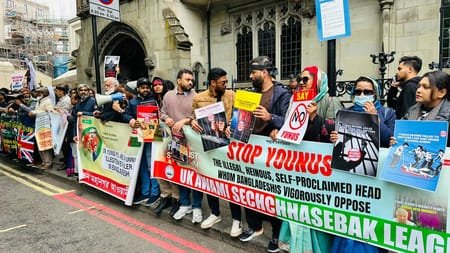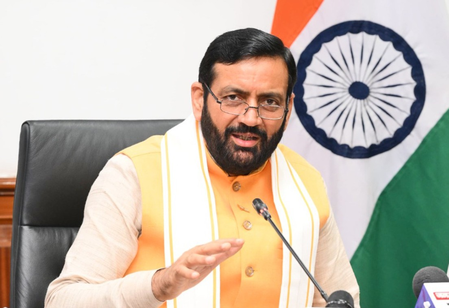
London, June 10 (IANS) Hundreds of protestors gathered outside the Heathrow Airport and also at a Central London hotel as Bangladesh interim government’s Chief Advisor Muhammad Yunus began a four-day visit to the United Kingdom on Tuesday.
Carrying black flags and banners – many of which read “Yunus is a killer of freedom fighters of Liberation War” – protestors shouted slogans like “Go back Yunus”, labelling him as a promoter of militancy and radicalism in Bangladesh.
Many also demanded immediate release of detained Hindu priest Chinmoy Krishna Das, asserting that it should be Yunus instead who should face the trial and be behind the bars.
Several eyewitnesses said that demonstrators, most of them from the Awami League and comprising of Bangladeshis living in the UK after being forced to flee the country since Yunus’ accession to power 10 months ago, even hurled shoes and eggs at the convoy of Yunus as it moved from the airport to the hotel.
The protestors maintained that they will stay put outside the hotel and rally at the venues where Yunus holds meetings during his stay, including outside the Chatham House on Wednesday and an all-day demonstration outside the UK Parliament on Thursday.
The demonstrators are also deeply unhappy with the UK Prime Minister Keir Starmer for reportedly scheduling a meeting with Yunus this week, warning that any formal meeting lends legitimacy to an unelected and unconstitutional administration.
In this regard, a formal letter from the Awami League’s UK branch has been sent to Downing Street, the Speaker of the House of Commons, the King’s Foundation, and the Commonwealth Secretariat, urging British officials not to recognise the Yunus administration.
The letter stated that at a time when Bangladesh is experiencing economic decline, escalating political repression, and growing human rights abuses – particularly against women and girls – the UK government’s decision to engage with Yunus threatens to send a damaging signal about the primacy of democracy and the rule of law.
“Tensions have escalated due to the recent banning of the Awami League by the Yunus government, which represents a deeply alarming departure from democratic norms. The Awami League is one of Bangladesh’s founding parties and is still supported by tens of millions of citizens and expatriates. Last week Yunus announced general elections in April 2026. Even if this promise is fulfilled, the Awami League’s forced exclusion from political participation will render this election inherently undemocratic,” it mentioned.
Bangladeshis in the UK alleged that even the freedom of press back home is under unprecedented attack as journalists backing Awami League have been arrested, and politically motivated charges have been brought against at least 140 others. The Human Rights Watch (HRW) has also highlighted a disturbing practice by authorities of filing vague or mass criminal complaints, enabling the arbitrary arrest of thousands, mostly, targeting Awami League supporters.
In the wake of the student-led quota movement, the country has descended into violence and instability. In the three months following last summer’s protests, over 2,000 attacks against Hindus and other minorities were recorded, and this figure has only risen. Women and girls are also being disproportionately affected: child rape cases rose significantly in early 2025, while a girls’ football tournament was cancelled under pressure from Islamist factions.
At the same time, civil unrest continues to grow. Most recently, public sector workers have taken to the streets to oppose unpopular reforms, adding to widespread discontent. The nation’s once high-growth economy, credited with lifting millions out of poverty, has been downgraded by the IMF, which warned GDP growth had fallen from 5.1 per cent to 3.3 per cent “reflecting economic disruptions caused by the popular uprising, a tighter policy mix, and heightened uncertainty that weighed on investment”. The IMF has also warned Yunus that he needs to improve his regime’s governance and transparency and that his legal reforms “should align with international standards”.
“It is ironic and extraordinary that an unelected leader is visiting the home of modern parliamentary democracy and expecting a warm welcome. This visit risks inflaming tensions in both Bangladesh and the UK, home to a large Bangladeshi diaspora. By offering credibility to such a government, Keir Starmer would compromise the UK’s reputation as a defender of democratic values,” said Mohd. Arafat, a spokesman for the Awami League.
“We urge the UK Government and His Majesty the King to press Yunus to commit to elections that are free and fair, rather than rigged against his critics. He must lift the ban on the Awami League, enable multi-party participation, and respect the democratic will of the Bangladeshi people,” he said.
Significantly, Bangladesh’s Islamist radical party Jamaat-e-Islami continues to make inroads in the UK with its substantial following and organizational structure among the Bangladeshi diaspora. In April, the top Jamaat leadership, including its Ameer Shafiqur Rahman, reportedly held a meeting with Bangladesh Nationalist Party (BNP) Chairperson and former Prime Minister Khaleda Zia at Tarique Rahman’s residence in London.
Yunus has formally invited BNP leaders to a meeting on Friday, revealed party Secretary General Mirza Fakhrul Islam Alamgir. The meeting will take place at the hotel where the Chief Adviser is currently staying in London.
On Tuesday, around 60-70 Jamaat supporters were also present outside the hotel where the Chief Advisor is staying with banners reading “Welcome Yunus”.
–IANS
int/scor/as






